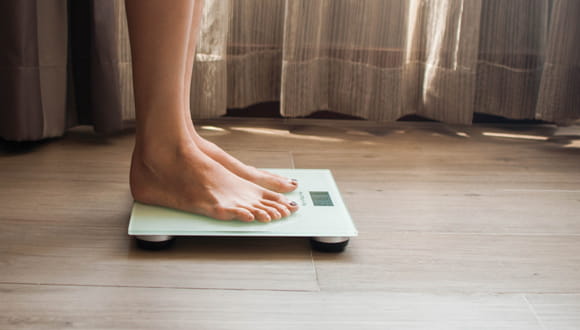Like many devices in our homes, the scales we use to monitor our weight are getting smarter.
But smart scales aren't limited to just Wi-Fi-enabled devices that help you track your weight via an app. Some are now smart enough to measure body composition.
"Body composition scales are helpful because, in addition to total weight, they measure how much of that weight is body fat, fat free mass and water," explains Melynda Dennis, a physician assistant specializing in weight management at Houston Methodist. "This is important because what we're most concerned about with weight is excess body fat, since this is what increases a person's risk of developing weight-related health issues."
Body composition scales have been used in clinics for years to assess whether patients are carrying excess body fat.
But now that you can buy one for your home, you may be wondering what you can and can't expect from a body composition scale.
How does a body composition scale work?
A standard scale calculates your weight by simply measuring physical load.
A body composition scale, on the other hand, uses bioelectric impedance analysis to determine how much of your total weight is fat-free mass and how much is body fat.
"If a person's body fat percentage is high, it's a sign that his or her body composition could be contributing to weight-related health issues, like diabetes," says Dennis.
According to the Obesity Medicine Association, a high body fat percentage is:
- 25% or higher for men
- 32% or higher for women
Are body composition scales accurate at measuring body fat?
A DEXA (dual-energy X-ray absorptiometry, best known for bone density testing) scan is the most accurate way of measuring body fat percentage, but — as a medical imaging test — it's not meant for routine use.
A body composition scale, on the other hand, is a reasonable alternative since it's more readily available to people. But these scales aren't without limitations — particularly the ones you can buy for your home.
"The biggest limitation of body composition scales generally is that a person's hydration status can affect accuracy," says Dennis.
If you're dehydrated, your body fat likely will be overestimated. If you're overhydrated, your body fat will will be underestimated.
"Additionally, other types of water weight, like swelling in the lower legs, can throw off readings," Dennis adds.
The sensitivity of the specific scale you're using affects accuracy, too. This is more of an issue for at-home scales, Dennis points out.
The more points at which the scale comes into contact with your body, the more accurate the bioelectric impedance analysis.
"The more sensitive scales measure from four points of your body — typically, both feet and both hands — making them more accurate than the two-point scales that measure only from your feet," says Dennis.
Although less accurate, the advantage of two-point scales is that they're affordable and small, meaning anyone can purchase one and regularly measure their body composition at home with it. Dennis says this is the best use of at-home scales since it allows you to track larger trends over time.
Four-point scales are more accurate but also large, costly and, as a result, often only found at wellness centers or weight management clinics, meaning most people don't have regular access to one.
"Even with the potential for variability with body composition scales, they are still reasonably accurate," says Dennis. "As with any particular measurement used to assess how your weight impacts your health, however, it's best to make sense of the results with the help of a skilled medical provider or dietitian."
How to make the most of an at-home body composition scale
While a two-point body scale isn't as accurate as the four-point alternative you find in a clinic, Dennis points out that these at-home body composition scales can still play a role in monitoring your weight.
"Don't worry over a particular reading on your scale at home," says Dennis "Instead, use it as way to track body composition trends over time. When the same scale is used under the same circumstances regularly, at-home body composition scales can be a great way to track your progress over time or uncover a significant shift in your body fat."
In other words, don't stress over the absolute numbers your scale provides. But if your body fat percentage increases from month to month you might consider discussing it with your medical provider.
Tracking trends over time using a body composition scale can also help guide healthy weight loss.
"When losing weight, you don't want to just generally lose pounds," says Dennis. "You want to lose body fat, specifically, while still maintaining — or even building — lean muscle mass. Simply looking at your total weight doesn't provide that level of detail in terms of healthy progress."
Just getting started with an at-home body composition scale? Here are Dennis' tips for using it effectively:
- Use the scale at the same time every day, preferably at a time when you're well-hydrated
- Avoid using the scale after drinking caffeine or alcohol
- Avoid using the scale after exercise
Additionally, always read the instruction manual before using a body composition scale. There may be safety warnings for people who are pregnant or have a pacemaker or defibrillator implanted.








